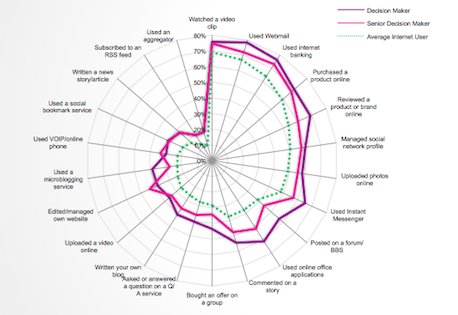GlobalWebIndex Research Shows Social Media tops B2B Influences
Press stories about social media could make you believe that platforms such as Facebook and Twitter are just for spotty teens and young adults on the pull. It’s all parties gone wild when 5,000 turn up and cyber bullying.
The facts are very different. Our first look at how senior decision makers and decision makers in the business-to-business use Facebook, Twitter and other social media networks reveals that they have become an essential part of the communications landscape. It’s a remarkable transformation for what has traditionally been regarded as a very traditional area.
Based on interviews with 17,425 decision makers in 27 markets from July 2009 to June 2011, all those interviewed – across 14 categories and five different sizes of company – had directly made purchase decisions for their organisation.
We’ve identified four clear trends:
#1.
B2B decision makers are the most socially engaged in the world: B2B decision makers are the most socially active consumers for all markets and demographics. This underlines how fundamental social media has become to B2B marketing.
This research shows, that if anything, social media is more appropriate for B2B marketing than consumer-focused marketing. It also demonstrates the need to have complete social marketing and sales strategy in place.
For example, as of June 2011, 39% of decision makers globally had used a micro-blog in the last month versus 22% for the average internet user while 60% had used a social network versus 50% for the average internet user
#2.
B2B decision-makers stand out most in developed markets: B2B decision makers stand out from consumer behaviour in developed markets. In developing markets such as China they are still more active than the norm but the gap is significantly smaller.
For businesses that operate and sell in the US, UK, Germany or any other high penetration internet market the need to focus marketing and sales through social media is even more vital.
For example when we asked B2B decision markers if they had used a micro-blogging service in the last month the figures for both the US and the UK were double those of the general internet population.
#3.
Social media communications has the most influential channel for business purchases globally, out ranking even face-to-face meetings, conferences, client entertaining or traditional trade advertising in most markets.
In June 2011, global decision makers said “Conversations with people from a
company/organisation on a social network” was their leading influence scoring 15%, the second ranked motivation was “direct mails”, scoring 13%. Among senior decision makers – those at senior manager level and above – conversations were level with “sales presentations”, both scoring 16%.
Conversations online now outrank advertising, direct mailings, webinars, conferences and corporate events while “Branded communities created by the company/organisation” are seen as more influential than Corporate events/ entertainment.
A few markets still favour face-to-face meetings over online ones but Australia, Spain, Argentina, the UK and Japan are the markets where “online conversations” are most valued over “sales presentations”.
#4.
B2B decision-makers are increasing their usage of social media: Despite an already high level of usage between July 2009 and July 2011, for example, social network usage increased from 41% to 60%, while micro-blogging grew from 21% to 39%.
Senior decision makers in the US have increased their use of social networks over the same period with 59% now having managed a profile in the last month compared to 53% in July 2009.
To succeed in this new social media powered landscape, firms will have to make substantial changes. We believe “conversations online” represents something broader than conversations on a social network. Buyers are saying they want to interact and converse online and seller companies need to create structures that enable this.
This is a guest blog by Tom from GlobalWebIndex. Image (c) GlobalWebIndex.



